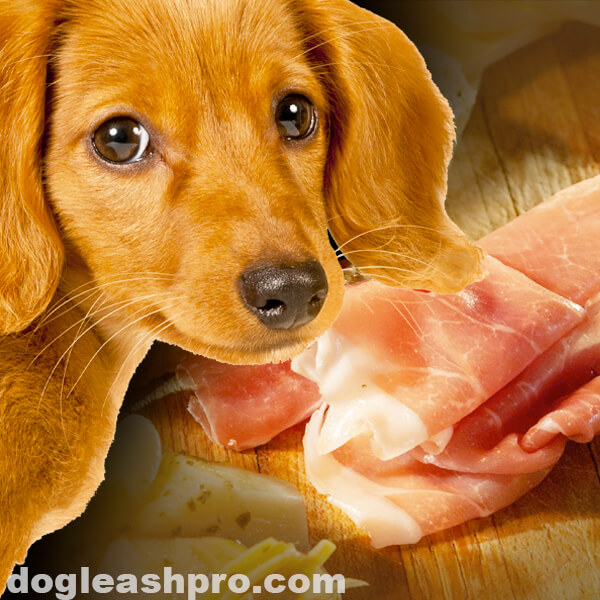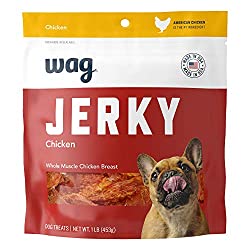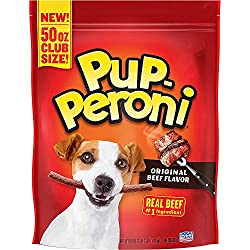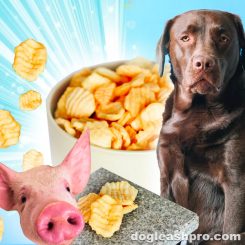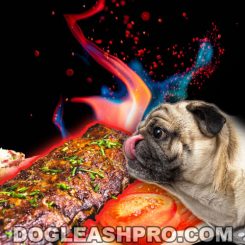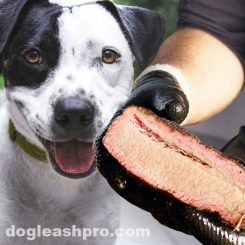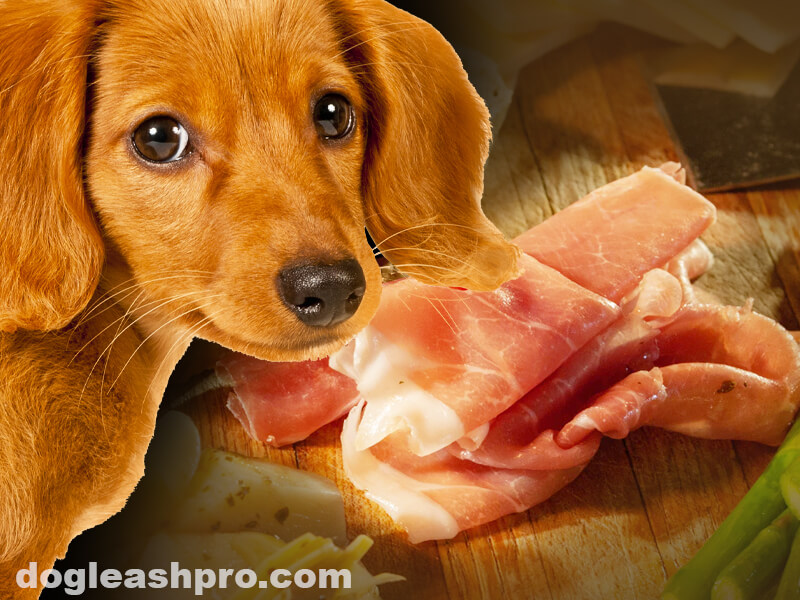
My family and I recently celebrated our grandmother’s birthday. We wanted her to feel special so we made the ultimate charcuterie board for her that includes Prosciutto among other salty yet tasty meat options. Our two dogs were very interested and wanted some. Before giving them the Prosciutto, I wondered if it was safe for them to eat, which inspired me to write this article.
Can dogs eat Prosciutto? No, dogs should not eat Prosciutto and should avoid it at all costs because this cured meat is highly processed, has a high salt and fat content, and can contain nitrates and spices that are extremely dangerous for dogs.
Table of Contents
Can dogs have Prosciutto?
No, dogs should not have Prosciutto and owners should avoid feeding their pooch Prosciutto at all costs.
Prosciutto is a highly salty and mouth-watering snack made for human consumption. The way this meat was processed and the high level of salt, fat, spices, and nitrates in it are harmful to our canine friends.
Eating this treat can lead to severe health problems in our canine friends. Since Prosciutto is a cured meat with a high salt level, it can cause dehydration in dogs.
If your furry family members eat Prosciutto in large quantities, they may get diarrhea, nausea, and become extremely thirsty. This extreme thirst will lead to frequent urination.
In the worst-case scenario, Prosciutto can also cause pancreatitis due to its high salt level.
Is it safe for dogs to eat Prosciutto?
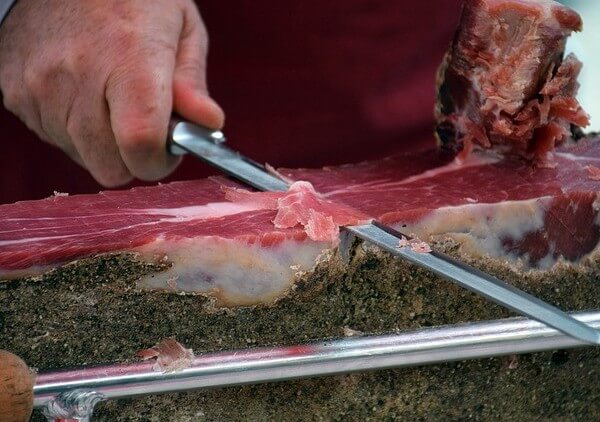
To find out why it is not safe for dogs to eat Prosciutto, let’s take a look at what Prosciutto is exactly, how it is made, and how it can cause health problems and distress to your canine friends.
What is Prosciutto?
Prosciutto is an Italian word, which means “ham” in English. This dry-aged ham is both an Italian delicacy and also a gastronomic symbol of Italy along with pizza and pasta. In Italy, Prosciutto is very popular because many people prefer dry-cured meat over boiled ham.
This raw Italian meat is salty, pink or brownish-red, and thinly sliced. Each thin slice of Prosciutto has a streak of fat on it. Depending on your preference, you can season the Prosciutto with spices like garlic and black pepper or herbs like rosemary and juniper.
Many people love to add spices and herbs to give the Prosciutto both an aromatic and unique flavor. Usually, Prosciutto is paired with the following:
- Dairy products: Fresh mozzarella cheese, aged parmesan cheese, and ricotta.
- Meat: Duck and turkey.
- Fruits: Fresh figs, cantaloupe, apricot, honeydew, nectarine, and peach.
- Vegetables: Asparagus, peas, cucumber, endive, fava bean, lettuce, artichoke, potato, spinach, and radish.
- Wine: Sauvignon Blanc, Prosecco, Pinot Grigio, and Sangiovese.
- Bread: Focaccia genovese, pane di segale rye bread, or traditional pane carasau flatbread.
- Herbs: Rosemary and thyme.
- Spices: Paprika and tarragon.
- Nuts: Macadamia nuts, pine nuts, and pistachio.
- Grain: Freekeh and rice.
- Sugar: Honey.
Alternatively, Prosciutto can be eaten on its own.
Fun Facts: Many dog owners prefer to give their pooch Pig feet instead of Prosciutto. Find out why in our article, Can Dogs Eat Pig Feet?
What is Prosciutto made of?
If you’re wondering, “What kind of meat is Prosciutto and is it safe for my canine friends?,” know that Prosciutto is made from pork legs. Not just any pork legs, but high-quality pork legs.
First, the meat from the pork legs is covered in salt and left alone for about 3 to 4 weeks. This traditional process dates back to when the villagers In Italy would dry-age the pork legs in order to increase the shelf life of the meat, especially during the cold winter.
The salt would do its job by drawing out both the moisture and blood from the pork legs. This makes the pork legs very dry and prevents any bacteria from growing on the meat. Keep in mind that bacteria grow and thrive in moist and humid environments.
Not only does salt help with the dry-aged process, but also adds the concentrated salty flavor to the meat.
After 3 to 4 weeks, the pork legs are then washed and seasoned again by hand. They are then left to dry-age again for another 14 to 36 months in a room that has temperature control. The salt, air, and length of time give the Prosciutto its salty, delicate, and sweet flavor.
Prosciutto nutritional value and ingredients
To fully understand why Prosciutto is not safe for dogs to eat, let’s go over the ingredients commonly found in this thinly sliced meat.
Raw ham is harmful to dogs

Prosciutto is essentially ham since it comes from the leg cut of a pig. Before you buy it, it is usually preserved.
Unfortunately, Prosciutto or raw ham is not safe for doggy consumption since there are cases of ham causing pancreatitis in dogs.
Additionally, since ham is pork, our furry friends may contract a number of potential diseases from eating Prosciutto such as:
Dogs can get Aujeszky’s disease or pseudorabies from eating pork products
Our canine friends can get infected with Aujeszky’s disease by eating meat products like pork that are uncooked or raw. This disease primarily affects pigs and when dogs eat raw pork or ham that has pseudorabies, there’s a high chance your pooch may have it too.
Symptoms of Aujeszky’s disease or pseudorabies includes:
- Loss of appetite.
- Constantly scratching skin due to itchiness.
This disease is extremely dangerous for dogs. It’s best to avoid feeding your pooch Prosciutto or ham or raw pork because there is currently no cure for Aujeszky’s disease in dogs.
Dogs have a high chance of contracting trichinosis from raw pork and meat
Some meat products like pork may be infested with worms. As a result, there may be larvae in the raw pork meat. Since Prosciutto is raw thinly sliced pork meat, it may contain larvae. When dogs eat Prosciutto that has larvae, they may contract trichinosis or trichinellosis.
The bad news is that even if you dry, fry, boil, or smoke the ham or meat, the trichinella larvae are still there and are not easily eliminated.
Dogs that have ingested Prosciutto that has been infected with trichinella larvae may have worms or eggs growing in their intestines and muscles for many months or even years. To avoid having your pooch contract the above two diseases, it’s best that you cut out pork from your pup’s diet.
High fat level in Prosciutto can cause upset stomach in dogs
Since Prosciutto is raw, there are streaks of fat still on the dry ham. Fats are neither healthy nor safe for dogs to eat. Here are some reasons why:
- First, dogs can not digest fat easily. When dogs eat fats such as from Prosciutto, they may have irritation and inflammation in their pancreas and as a result, get an upset stomach.
- The fat from Prosciutto does not provide any nutritional value or benefit to our pups so it’s not necessary to feed them Prosciutto.
High salt levels in Prosciutto are harmful to dogs
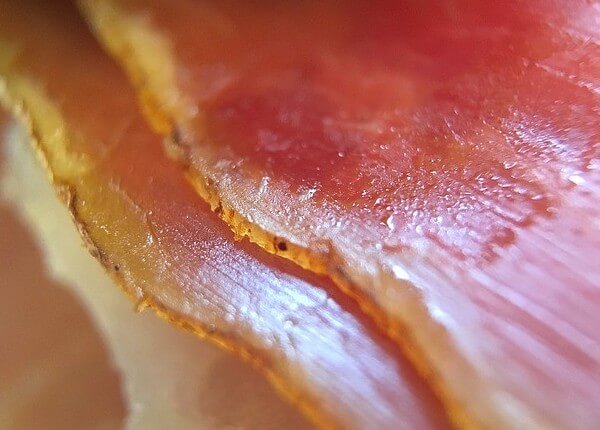
Prosciutto is a risky food option for our furry friends because it has a high salt content. Ingesting excessive salt can do damage to your pup’s kidneys. If your pooch has renal dysfunction, please avoid feeding him or her Prosciutto.
Symptoms of sodium poisoning include:
- Excessive thirst leading to drinking a lot of water.
- Frequent urination.
- Diarrhea.
- Vomiting.
- Stomachache.
- Pancreatitis (in severe cases).
If you notice any of these signs and symptoms in your four-legged friends, you’ll need to bring them to the veterinarian immediately. Your vet will have to perform a physical checkup and do a blood test.
When your pups are excessively thirsty, keep an eye on them because drinking a lot of water very fast out of excessive thirst can lead to bloating. When water builds up in the stomach, it causes the stomach to expand and become heavy. It is possible that the stomach may spin around itself and twist. This is life-threatening and may be fatal in canines.
It’s best to actually bring your pups to the vet as soon as you notice them drinking a lot of water so they could be put on IV fluids right away, which is more controlled.
Fun Facts: If your canine pooch is lactose-intolerant, avoid feeding them food with dairy products like Cream of Mushroom Soup because it can also cause bloating, abdominal pain, and diarrhea in dogs.
Spices like paprika, cayenne pepper, and garlic are toxic to dogs
Spices like garlic are usually found in Prosciutto and this is an absolute no-no for our furry friends. In fact, garlic is toxic to dogs. That’s because garlic contains thiosulfate, which can cause hemolytic anemia in our canine friends.
Thiosulfate deprives the red blood cells of oxygen and essentially damages the red blood cells.
Garlic poisoning can cause the following gastrointestinal upset:
- Drooling.
- Nausea.
- Diarrhea.
- Vomiting.
- Abdominal pain.
- Increase respiratory rate and heart rate.
- Muscle loss leads to weakness and collapse.
- Pale gum.
- Lethargy.
Similarly, while paprika isn’t likely to cause severe harm to dogs, this seasoning can also cause diarrhea in dogs and even upset your pup’s stomach.
Try to keep cayenne pepper away from your pooch as well. The cayenne pepper can cause eye, nose, and throat irritation in dogs.
For these reasons, dog owners should keep Prosciutto out of their dog’s reach.
Nitrates are dangerous to dogs
If you know that the Prosciutto contains nitrates, keep this human snack away from your four-legged friends.
Sometimes nitrates are added to act as a preservative, which will further extend the shelf life of Prosciutto. However, nitrates react when they come into contact with the bacteria in your dog’s saliva. When this happens, nitrates convert to a chemical called nitrites and nitrites are very dangerous to dogs.
When dogs ingest nitrites, they can affect your dog’s gastrointestinal tract or gut. Our dog’s gut is very acidic and when nitrites react with the acidity, it creates nitrous acid. Essentially, your pooch may have nitrosamines, which are carcinogenic and can cause the following toxicity in dogs:
- Organ system toxicity.
- Developmental toxicity.
- Reproductive toxicity.
Prosciutto substitutes that are dog-friendly and safe
You can offer your pooch beef Prosciutto as they are a good supplement to your dog’s diet. Beef Prosciutto also provides nutritional value to your pup unlike Prosciutto from pork. Beef Prosciutto makes for a great treat since it is wet and smooth meat in the form of prosciutto pate.
As a dog owner myself, I try to only give my two pups canine-friendly treats and they both love these and are always begging for more:
So, can dogs have Prosciutto?
With that said, dog owners should avoid feeding Prosciutto to their canine family members. After all, Prosciutto is made for human consumption and not all human food is safe for our canine companions to eat. Prosciutto should not replace your dog’s regular meal or treats by any means.
If your pooch displays the signs and symptoms we’ve mentioned above or you suspect your pup is not feeling well, it’s crucial that you consult with your dog’s vet as soon as possible. Your vet will help you come up with healthier canine-friendly food options and provide you with helpful advice.
Related Questions
No, dogs should avoid uncured Prosciutto. Although uncured Prosciutto has less salt than cured Prosciutto, the meat itself still has a lot of fats in it. This is why dogs should stay away from uncured Prosciutto as well. Our canine friends can’t digest fats properly and the fats found in Prosciutto is bad for their digestive system and heart.
Prosciutto comes from the pig’s hind leg whereas pancetta comes from the pig’s belly. Prosciutto is safe to eat raw while you must cook pancetta before eating it.
DISCLAIMER: THIS WEBSITE DOES NOT PROVIDE MEDICAL ADVICE
The information, including but not limited to, text, graphics, images and other material contained on this website are for informational purposes only. No material on this site is intended to be a substitute for professional veterinary advice, diagnosis, or treatment. Always seek the advice of your veterinarian or other qualified health care provider with any questions you may have regarding dietary needs.
Resources:
https://en.wikipedia.org/wiki/Prosciutto
https://pubmed.ncbi.nlm.nih.gov/2186503/

With over five years of specialized experience as an animal writer, my expertise lies in dog nutrition, health, behavior, grooming, and training. I am dedicated to delivering helpful and informative content that caters to the well-being of our furry friends. My primary goal is to empower pet owners with knowledge and ensure our canine companions thrive in health and happiness. In my free time, I love volunteering at local dog rescue centers.
